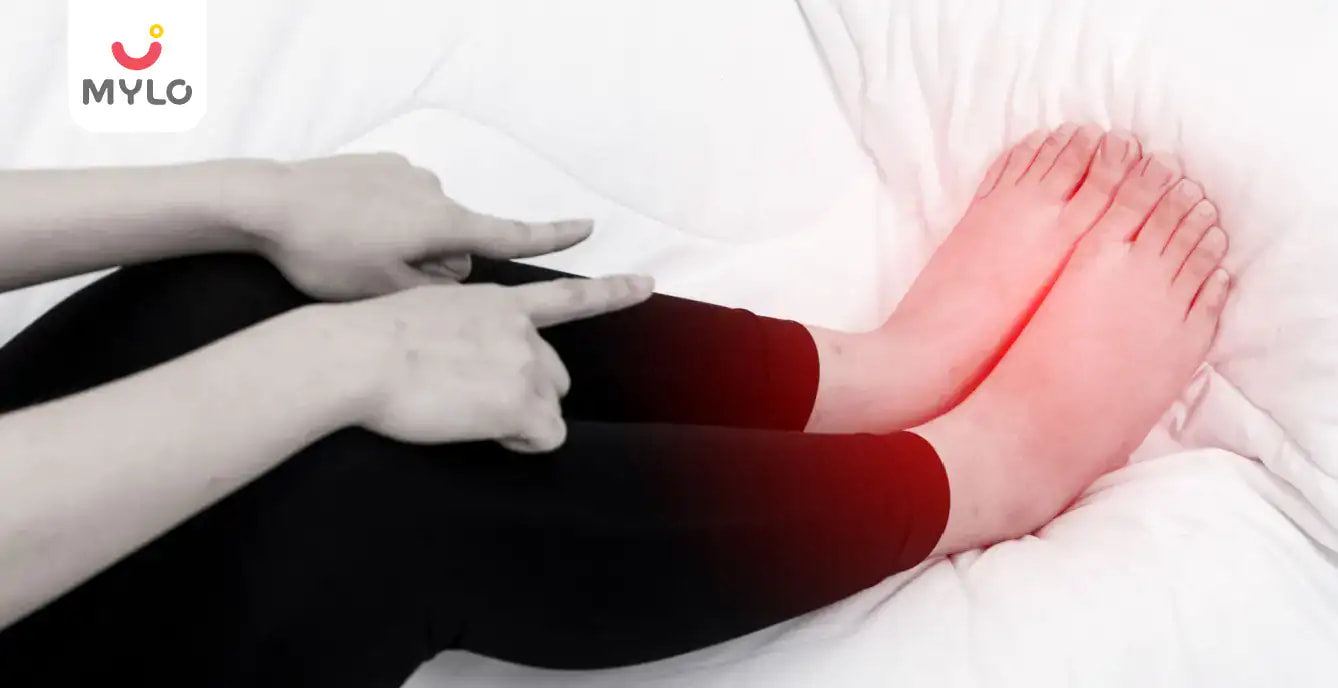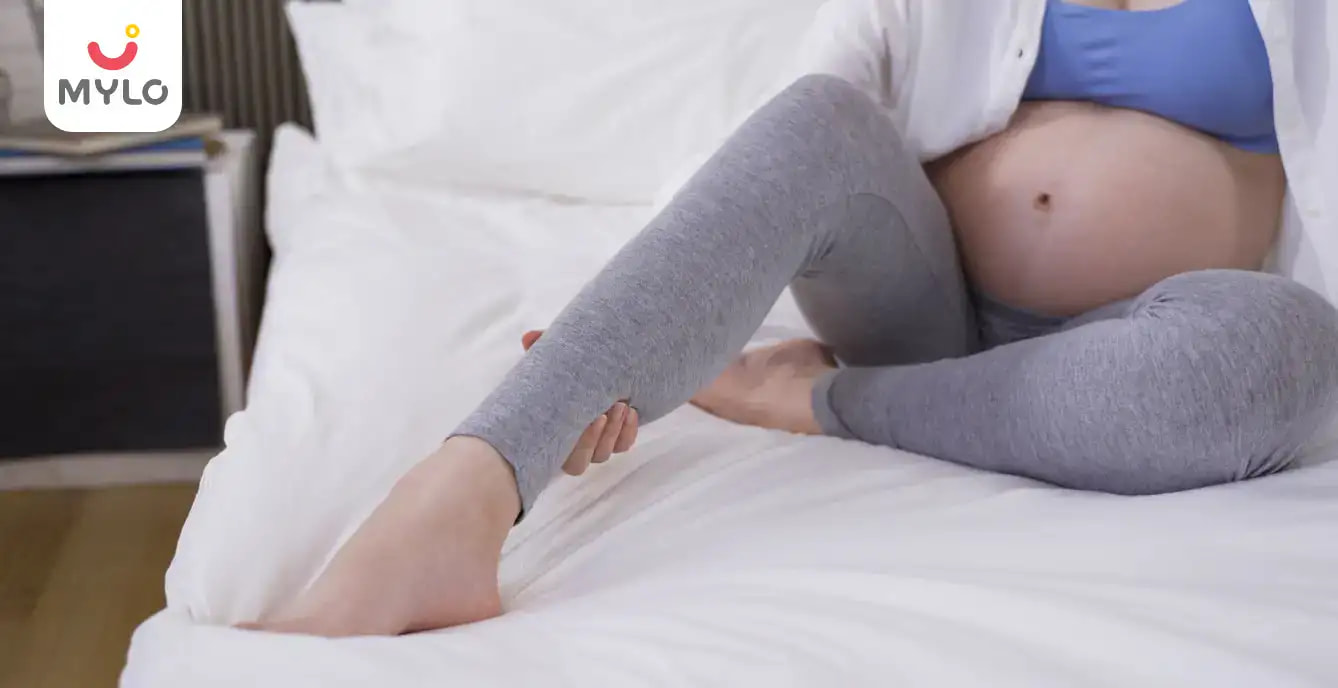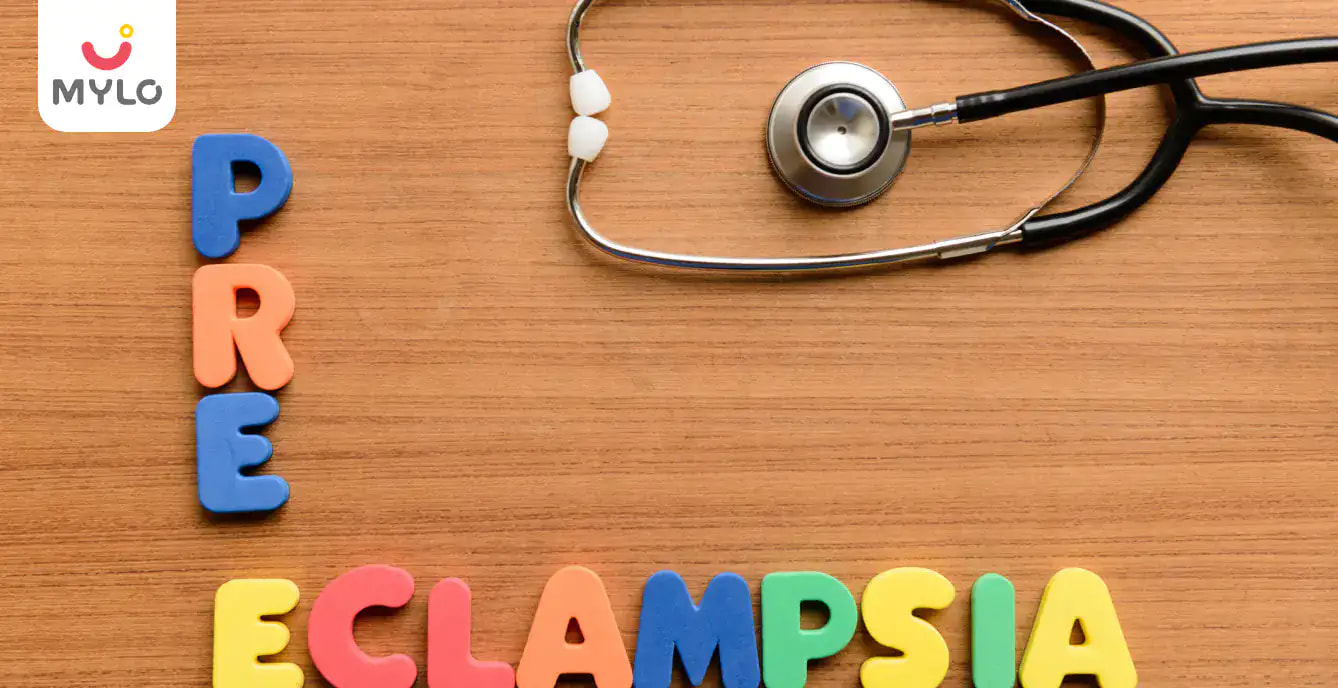Home

Swollen Legs

Swelling During Pregnancy: Causes & Warning Signs & Symptoms
In this Article

Swollen Legs
Swelling During Pregnancy: Causes & Warning Signs & Symptoms
Updated on 3 November 2023
A myriad of factors can cause swelling during pregnancy, especially swollen feet. While some of these symptoms are common during pregnancy, sometimes they might signify more concerning disorders like preeclampsia. Let us understand in detail about swelling during pregnancy, its causes and warning signs and symptoms.
Causes of Swelling During Pregnancy
Here are some reasons why you may experience swelling during pregnancy:
1. Retention of fluid
The blood volume of a pregnant woman doubles. This surge may vary from woman to woman, with some reporting growth of approximately 100% over pre-pregnancy levels.
Fluid and hormonal changes might increase plasma in your blood relative to red blood cells, which is expected. A condition known as physiological anaemia occurs as a consequence. A healthy pregnant woman might have up to 80% edema in pregnancy. However, the feet are the most common location for this condition to appear.
2. Dehydration
Due to the increased demand for water during pregnancy, fluid retention may indicate dehydration. Women who don't drink enough water are at risk of constipation, anemia, and edema if they don't stay hydrated. Dehydrated pregnant women may have a lower chance of delivering a healthy baby.
3. Certain medicines
Several over-the-counter and prescription drugs might raise the risk of edema. Some persons may develop water retention and peripheral edema due to using nonsteroidal anti-inflammatory medicines (NSAIDs).
Antacids are often used to treat heartburn in pregnant women. Swelling in pregnancy may occur if sodium bicarbonate-containing drugs are taken in excess.
4. Preeclampsia
As a result of preeclampsia, pregnant women are more likely to have swollen feet. A rapid rise in blood pressure in women who had previously had good readings is the hallmark of this illness. The presence of protein in urine is another telltale sign of this illness. Approximately one in every twenty-five pregnant women in the US is affected by this issue.
Women with preeclampsia are more likely to have swelling during pregnancy in their hands and feet. Thus, these signs should be taken carefully. Seizures are a possibility if preeclampsia is not addressed.
You may like : What are varicose veins and how to prevent them during your pregnancy?
When and Where Does a Pregnant Woman Develop Swelling?
The feet and ankles should be the only swollen parts of your body. Even if your fingers swell a bit, it shouldn't be noticeable enough that you can't wear your rings anymore.
When you're in your second or third trimester of pregnancy, you may notice a tingling sensation in your lower abdomen. This usually begins about week 22 and lasts until you give birth. Pregnant women are more susceptible to edema than the general population.
As the day progresses, you may notice that your feet and ankles swell. This is primarily due to gravity – if you spend more time on your feet, additional fluid will accumulate in your feet and ankles.
Warning Signs of Swelling During Pregnancy
Swollen feet, often known as edema, are an essential pregnancy symptom. It might be difficult for some women to tell whether a problem is just a minor inconvenience or something that requires immediate medical treatment. Signs of swollen feet include the following:
1. Your shoes are no longer the right size
Having to buy bigger shoe sizes is a common symptom of pregnancy-induced edema, even if it may seem trite to pregnant women. Compression stockings and reduced time spent on your feet might help alleviate pain. A flat, supportive shoe half a size larger than your pre-pregnancy shoes could also be good.
2. Stiffness while you stand
Standing for lengthy periods may induce the accumulation of extra fluid in the legs and feet due to gravity. Pregnant women may find it difficult to stand or walk for long periods.
3. Your skin's color, texture, and look change
Even though swelling may be seen at first look, not all women know it. If you examine carefully, the skin is considerably tighter. Depending on your height, the feet and ankles may seem shorter or taller than the rest of your leg.
Final Words
Pregnancy-induced swelling of the ankles and feet is joint. Anxieties about bumps are understandable since they may be painful, cause your shoes to become uncomfortable, and even make you feel self-conscious so home remedies for swollen feet during pregnancy is the best solution. To keep yourself as comfortable as possible, it's essential to know what to watch out for and how best to deal with it.
References
FHCSD. Swelling in Pregnancy—When to Worry and When Is It Normal?. www.fhcsd.org



Written by
Ravish Goyal
Official account of Mylo Editor
Read MoreGet baby's diet chart, and growth tips

Related Articles
Related Topics
RECENTLY PUBLISHED ARTICLES
our most recent articles

Diet & Nutrition
গর্ভাবস্থায় আলুবোখরা: উপকারিতা ও ঝুঁকি | Prunes During Pregnancy: Benefits & Risks in Bengali

Diet & Nutrition
গর্ভাবস্থায় হিং | ঝুঁকি, সুবিধা এবং অন্যান্য চিকিৎসা | Hing During Pregnancy | Risks, Benefits & Other Treatments in Bengali

Women Specific Issues
স্তনের উপর সাদা দাগ: লক্ষণ, কারণ এবং চিকিৎসা | White Spots on Nipple: Causes, Symptoms, and Treatments in Bengali

Diet & Nutrition
গর্ভাবস্থায় পোহা: উপকারিতা, ধরণ এবং রেসিপি | Poha During Pregnancy: Benefits, Types & Recipes in Bengali

Diet & Nutrition
গর্ভাবস্থায় মাছ: উপকারিতা এবং ঝুঁকি | Fish In Pregnancy: Benefits and Risks in Bengali

Diet & Nutrition
গর্ভাবস্থায় রেড ওয়াইন: পার্শ্ব প্রতিক্রিয়া এবং নির্দেশিকা | Red Wine During Pregnancy: Side Effects & Guidelines in Bengali
- ইনার থাই চ্যাফিং: কারণ, উপসর্গ এবং চিকিৎসা | Inner Thigh Chafing: Causes, Symptoms & Treatment in Bengali
- গর্ভাবস্থায় ব্রাউন রাইস: উপকারিতা ও সতর্কতা | Brown Rice During Pregnancy: Benefits & Precautions in Bengali
- Velamentous Cord Insertion - Precautions, Results & Safety
- Unlock the Secret to Flawless Skin: 7 Must-Have Qualities in a Face Serum
- Unlock the Secret to Radiant Skin: How Vitamin C Serum Can Transform Your Complexion
- Gender No Bar: 10 Reasons Why Everyone Needs a Body Lotion
- Unlock the Secret to Radiant Skin How to Choose the Perfect Body Lotion for Your Skin Type
- Top 10 Reasons to Apply a Body Lotion After Every Bath
- Communication in Toddlers: Milestones & Activities
- How to Improve Vocabulary for Toddlers?
- A Comprehensive Guide to Understanding Placenta Accreta
- Vulvovaginitis in Toddlers Causes, Symptoms and Treatment
- A Comprehensive Guide to Understanding Cerebral Palsy in Children
- Bitter Taste in Mouth During Pregnancy: Understanding the Causes and Remedies


AWARDS AND RECOGNITION

Mylo wins Forbes D2C Disruptor award

Mylo wins The Economic Times Promising Brands 2022
AS SEEN IN

- Mylo Care: Effective and science-backed personal care and wellness solutions for a joyful you.
- Mylo Baby: Science-backed, gentle and effective personal care & hygiene range for your little one.
- Mylo Community: Trusted and empathetic community of 10mn+ parents and experts.
Product Categories
baby carrier | baby soap | baby wipes | stretch marks cream | baby cream | baby shampoo | baby massage oil | baby hair oil | stretch marks oil | baby body wash | baby powder | baby lotion | diaper rash cream | newborn diapers | teether | baby kajal | baby diapers | cloth diapers |








